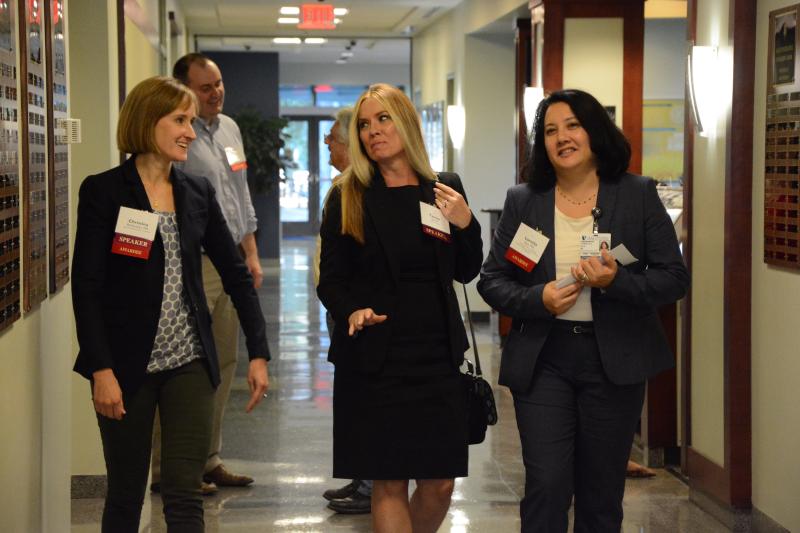
In April, Duke University Engineering alumnus Alan Kaganov and his wife Carol gave the university a gift of $3 million to advance research efforts for pulmonary medicine in collaboration with the Duke Pratt School of Engineering and School of Medicine this fall.
To honor the Kaganovs’ contribution, Duke MEDx organized the Kaganov Symposium Friday Oct. 20. The symposium featured innovative advocacy and progressive pulmonary research. MEDx also presented the inaugural Kaganov Innovation Fund awards.
The research and discussions tackled different areas of pulmonary disease, including advocacy for better therapies, the history of pulmonary diseases, and biomedical engineering’s role in treating pulmonary diseases.
These were the following symposium speakers:
- Teresa Barnes, editor, advocate for patients with lung disease
- Scott Palmer, MD, Vice Chair for Research, and professor of medicine (Pulmonary)
- Michael Rubinstein, Ph.D., UNC-Chapel Hill John P. Barker Distinguished Professor
- Christina Barkauskas, MD, assistant professor of medicine (Pulmonary)
- Bastiaan Driehuys, Ph.D., professor of radiology (Biomedical Engineering)
- Jamie Todd, MD, assistant professor of medicine (Pulmonary)
“It was very nice to bring people from different backgrounds and looking at new interesting problems together. This is how discoveries are made,” said Rubinstein. “I think that it was interesting to see the spectrum and interconnection between different approaches to pulmonary research.”
After Ravi Bellamkonda, Dean of Pratt School of Engineering, gave a brief introduction, Barnes was welcomed to the podium. She shared her personal story with pulmonary disease in her family and how it drove her to become an advocate for better treatments and furthering research for patients with lung diseases. She lost four family members to pulmonary fibrosis within a short time period and has since worked with organizations such as the Coalition for Pulmonary Fibrosis and Pulmonary Fibrosis Foundation’s Daughters of PF program.
“It was nice that they offered that first talk with Ms. Barnes about the humanistic approach pulmonary fibrosis,” said Biomedical sciences graduate student Ahmed Abdul Noor. “It puts into perspective why we’re doing research. I haven’t seen that in a lot of the talks I’ve been to, which have been more technical.”
Dr. Todd’s presentation focused on studying pulmonary fibrosis’ genetic structure and its genetic variation using whole-exome sequencing. Dr. Barkaukas’ study explored the “maintenance and repair of distal gas exchange region in the lung,” which is composed of millions of clustered alveoli. She also focused on its relation to the pathogenesis of pulmonary fibrosis.
Dr. Palmer’s presentation studied different perspectives of IPF such as its natural history, the current practice patterns for IPF diagnosis, and IPF’s impact on patient quality of life in an observational registry study known as IPF PRO, which has enrolled nearly 700 patients across over 30 clinical sites.
“There are incredible unmet needs. You heard Teresa make a passionate call for more research and from an academically clinical standpoint, the burden of this disease is huge. The opportunity to make a difference is huge. We estimate about 40,000 patients die each year from IPF."
Scott Palmer, MD
The IPF PRO registry also collects biological samples including blood and DNA; in combination with clinical data collected over time on patients, Palmer says the study will inform best use of existing therapy and discovery of novel treatment and disease biomarkers. Work on IPF is in collaboration with the DCRI Outcomes Group, and faculty co-investigators Megan Neely, PhD, Todd, and Laurie Snyder, MD.
In October 2014, the first two drugs to treat IPF nintedanib and pirfenidone were approved by the FDA, Palmer reported.
“Once patients are diagnosed with IPF, survival is dismal,” said Palmer. “There are incredible unmet needs. You heard Teresa make a passionate call for more research and from an academically clinical standpoint, the burden of this disease is huge. The opportunity to make a difference is huge. We estimate about 40,000 patients die each year from IPF.”
After the symposium presentations, the $150,000 Kaganov Innovation Fund grant recipients were announced by Bellamkonda:
- Epithelial-Mesenchymal Crosstalk in Idiopathic Pulmonary Fibrosis: Generation of a Crucial Experimental Toolkit
Christina Barkauskas, M.D., Purushothama Rao Tata, Ph.D., and Charlie Gersbach, Ph.D. - Pulmonary Neuropeptide Regulation of Fibrotic Airway Disease
Xiling Shen, Ph.D., and Loretta Que, MD - Measuring perturbations of biochemical and mechanical homeostasis in pulmonary fibrosis
Brent Hoffman, Ph.D. and Scott Palmer, MD
The Kaganov recipients' engineering-pulmonary partnerships address the critical problems in lung disease, which patients and families such as Teresa's face every day. With developing novel approaches from these teams, the projects will strive to reduce the burden and find better methods to treat the lung disease epidemic.
Pictured Above: Left to right, Christina Barkauskas, Teresa Barnes, and Kaganov grant recipient Loretta Que chatting during the symposium's break.